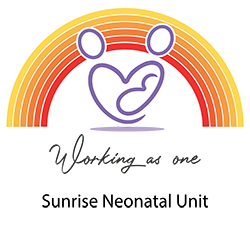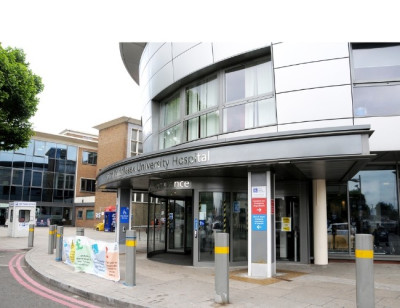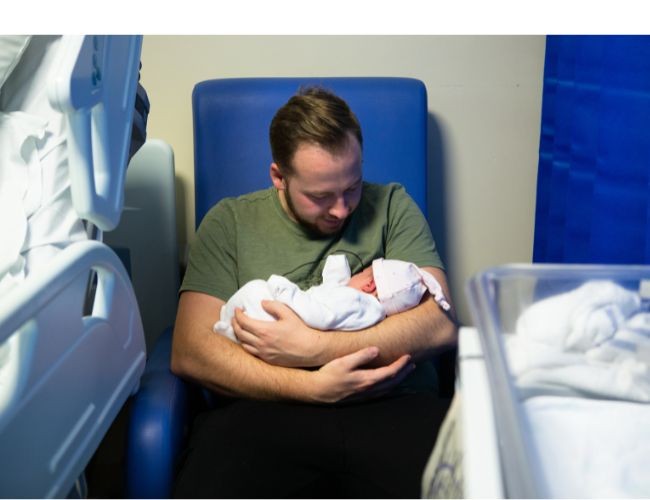
Our neonatal units provide special care for babies who need to be monitored closely because they have been born slightly early or are unwell.
This service is available at both Barnet Hospital and the Royal Free Hospital. Intensive care for more premature or unwell babies who need specialist care is located at Barnet Hospital only.
We try to maintain a quiet, calm environment at both our units where light levels are kept low and unnecessary noise is kept to a minimum.
Each unit has a multidisciplinary ward round from 9am to 12 noon. Parents are invited to be present at this time and will have an opportunity to ask questions of our doctors and nurses.
If you cannot attend the ward rounds, you will be able to make another appointment with your baby’s consultant to discuss their progress. Please ask the neonatal nurse in charge to arrange this for you.
The Starlight neonatal unit is on level 2 of Barnet Hospital, next to the antenatal clinic and opposite Galaxy ward and the children’s outpatient department.
It has 30 cots for babies born from 27 weeks’ onwards. We provide different levels of care depending on a baby’s development and condition, including neonatal intensive care for newborn babies.
The Starlight unit was the first UK neonatal unit to provide 10 individualised care rooms for family centred developmental care where parents can stay throughout the neonatal journey. This allows parents to learn valuable skills and knowledge while being supported by trained staff to confidently care for their baby.
The neonatal nursing team at Barnet Hospital is also on hand to support parents with planning and advice for the initial period at home, which helps to reduce the length of stay for premature babies.

The team work closely with our maternity birthing centre, labour ward, and different neonatal units within the London neonatal network for the provision of specialist neonatal care, including surgery.
We do not have a residential facility for parents, but invite parents to visit their baby anytime on the unit. In addition, we have three parent bedrooms available for parents to stay overnight in preparation for discharge or support.
Doctors’ rounds
Ward rounds start at 10am. Virtual ward rounds are provided for parents who are unable to be there on the day but would like to join online.
Parents’ support group
Parents’ support group meetings are held every Monday at 11am to 12 noon in the quiet room.
This is a safe space for parents to share their neonatal journey and receive support from veteran parents and members of the neonatal team.
The neonatal unit on ward 6 West B at the Royal Free Hospital is next to the children’s ward on the 6th floor of the main tower block.
It offers care to infants born from 34 weeks’ and above to support the establishment of feeding and growing.
Intensive care is not available at the Royal Free Hospital. Babies requiring intensive care are transferred to Barnet Hospital by our medical transport team.
Our Royal Free Hospital neonatal unit has rooms for parents to stay in the 24-hour period prior to your baby coming home, so you can care for them and develop knowledge and confidence while still being supported on the unit by our nursing staff.
Babies who require specialist neonatal care at Barnet Hospital or other hospitals may be transferred back to the Royal Free Hospital when they are stable for their ongoing care.
Parents are encouraged to spend as much time as possible with their baby over each 24-hour period.
Grandparents and siblings can visit daily, and other adult visitors are able to visit between 2 and 7pm.
When visiting our neonatal units, please observe the following:
- No children other than siblings can visit and children must be accompanied by a parent.
- There can be only two visitors at the cot side at any one time.
- All visitors are asked to take off their outdoor coats/jackets (but not leaving valuables in pockets) and hang them up on the hooks provided.
- All visitors are asked to use the hand gel rub when entering the nurseries.
- It is not advised to visit the units if you are feeling unwell.
We ask parents to provide nappies and cotton wool/baby wipes (fragrance free) for the duration of your baby’s stay.
We have a large supply of baby clothes, but you are welcome to bring your own for your baby to wear if you would prefer.
We are accredited by the World Health Organization and UNICEF as part of their Baby Friendly initiative, which aims to promote and improve breastfeeding uptake.
You are supported in establishing breastfeeding if your baby is in our neonatal unit, including helping you to express your milk so you can maintain a good milk supply.
We will regularly observe your baby’s development and we may carry out specific monitoring tests.
The neonatal nursing team will check and record temperature, heart and respiratory rates. Your baby may be connected to monitors to allow for continuous observations.
Some babies may require saturation monitoring — this is where a probe is attached around a hand or foot to show the level of oxygen in your baby’s blood.
How early or how often your baby feeds is a key part of baby development and can be determined by their blood glucose levels. These are measured using a single drop of blood collected from the heel.
Your baby’s intake and output will be monitored with every millilitre of fluid or milk. In addition to a record of your baby’s weight, this information shows how your baby’s development is progressing.
We offer a full range of newborn screening tests on our neonatal units to make sure the babies in our care are fit and healthy.
Newborn blood spot screening
Newborn blood spot screening is offered to all babies born in the UK to help identify rare but potentially serious conditions.
Most babies screened will not have any condition but, for the small numbers who do, the benefits of blood spot screening are enormous.
The test involves the nurse or doctor pricking your baby’s heel using a special device to collect some drops of blood (the blood spot) onto a card on the day your baby is admitted to the neonatal unit, on day five and at a corrected age of 36 weeks. The card is sent to a laboratory for analysis after each test.
You will receive a letter with the results by post usually within six weeks of the blood spot being taken. You will be contacted sooner if there is a suspected condition.
Screening for retinopathy of prematurity
Retinopathy of prematurity is an eye condition that affects the blood vessels of the retina. It can occur in very premature babies or those with a very low birth weight.
The condition is usually very mild and settles on its own without the need for any treatment.
If your baby requires screening for retinopathy of prematurity, the first examination will be carried out between four to six weeks of age by a specialist eye doctor, called an ophthalmologist.
Brain development scans
Premature babies (those born at less than 32 weeks) are at an increased risk of bleeding in the brain.
Ultrasound scans of the head may be performed to look at the structure of the brain and to see if there is any bleeding or other problems affecting your baby’s brain development.
The results of these scans will be explained to you by the medical team looking after your baby.
There are no set criteria for when your baby will be well enough to go home from the neonatal unit, but we can confidently allow babies as young as 34 weeks to go home, if they weigh from 1600 grams and the neonatal team is happy for them to do so.
Parents are supported with feeding, medication, oxygen therapy and help with any ongoing medical needs.
 Translate
Translate




